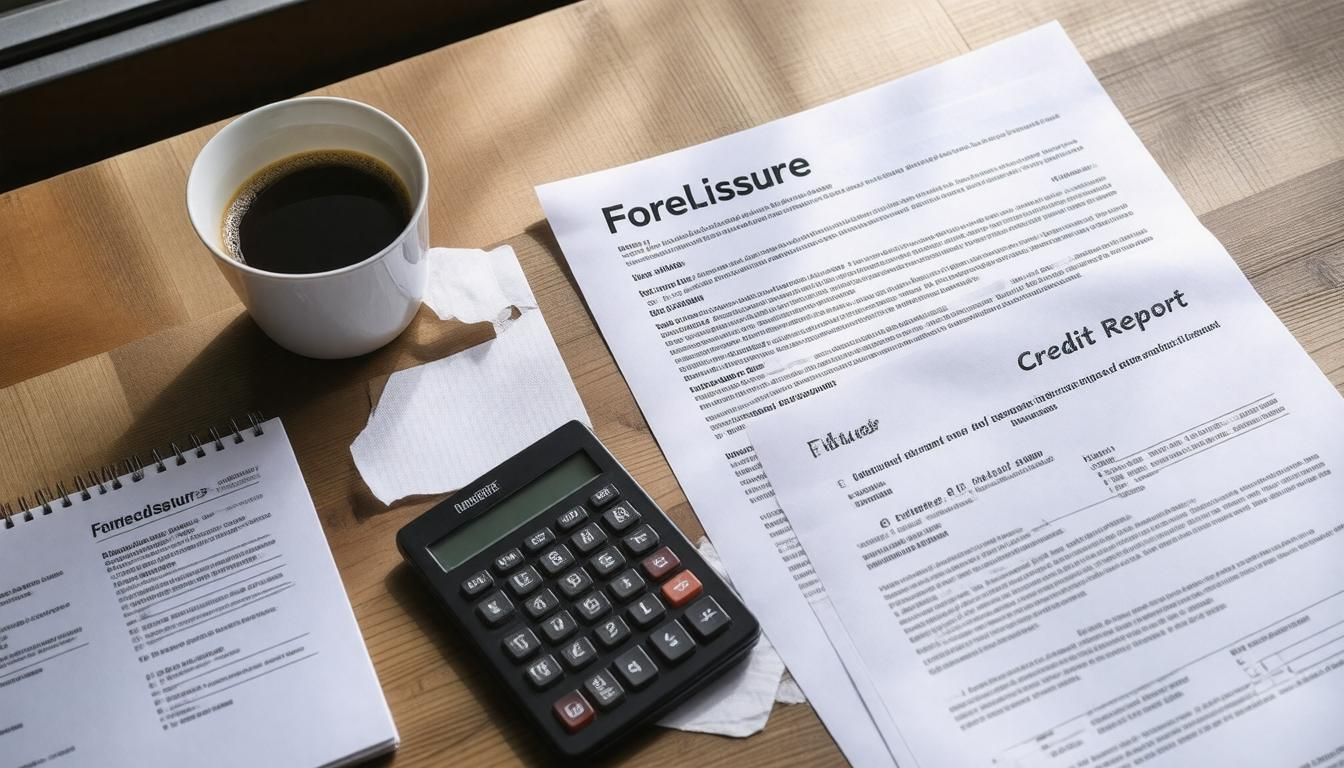Call or Text (601) 202-5183 for a FREE consultation!
What To Do When You Get a Foreclosure Notice: Helpful Advice and Options
What To Do When You Get a Foreclosure Notice

Receiving a foreclosure notice can feel like a punch to the gut, throwing your life into chaos. It's easy to spiral into fear and anxiety about losing your home, but don't let that initial shock paralyze you. Instead, take a deep breath and remind yourself that knowledge is power in this situation. Understanding what a foreclosure notice entails, along with knowing your rights and options, is essential for regaining control. In this article, we'll walk you through what steps to take immediately upon receiving that notice so you can tackle this challenge head-on and explore practical solutions to keep your home or navigate the next steps wisely.
When you receive a foreclosure notice, it's important to first assess your financial situation and understand your options, which may include loan modifications, repayment plans, or selling your home. Additionally, familiarize yourself with your legal rights regarding foreclosures and consider seeking professional help from financial advisors or real estate professionals to navigate this challenging process effectively.
Receiving the Foreclosure Notice
Getting that dreaded piece of mail, the foreclosure notice, is something no homeowner wants to face, yet it can happen to anyone. The most important thing to remember in that moment is that it's not an insurmountable situation. Within the storm of emotions—fear, embarrassment, frustration—there lies an opportunity for action. A calm and collected mindset enables you to tackle this challenge head-on, rather than letting it overwhelm you.
Your immediate reaction is crucial. Many homeowners often open this notice and feel a surge of panic. Instead, you should approach it with a sense of purpose. The first step is to read through the notice in detail. Understanding its contents lets you know exactly what you're up against and what deadlines you need to keep in mind. This chapter may feel daunting, but clarity comes from knowledge.
Consider noting these key points as you read:
- Timeline: What are the deadlines highlighted?
- Loan Information: Which loan is being foreclosed upon?
- Contact: Who you should contact at your lender's office for more information?
After taking a deep breath and processing the information, focus on documenting everything. Keeping careful records of all communication with your lender can serve as an essential safeguard down the road—especially if legal complexities arise. Create a log that includes dates, times, and summaries of your conversations or any email exchanges. This record will provide a clear timeline and evidence should discussions turn into disputes.
Another pressing step after you've documented everything is to respond promptly. Ignoring the notice is a surefire way to accelerate your troubles; don't fall into that trap. By sending a written acknowledgment back to your lender confirming receipt of the foreclosure notice, you show initiative while protecting your rights. This act—seemingly minor—can sometimes prevent misunderstandings and reflects your commitment to resolving the matter.
Tim’s experience serves as a beacon of hope here; when he received his foreclosure notice in Texas, instead of panicking, he took immediate action by gathering his documents and communicating effectively with his lender. His quick response gave him better footing and significantly improved his chances of finding a solution without losing his home.
With a clear understanding of what steps to take immediately after receiving a foreclosure notice, it’s essential now to evaluate your overall financial position to make informed decisions moving forward.
Assessing Financial Health
Understanding your financial situation is crucial. It helps clarify what you can manage and what options are available as you face foreclosure. Take a moment and think about your current debts and expenses; this will allow you to make informed decisions regarding your property and any potential sale. The first step in this process is calculating your total debt.
Steps to Evaluate Your Finances
The first task is Total Debt Calculation. Begin by summing up all outstanding debts—this includes everything from your mortgage to credit card balances, personal loans, or even student loans. A report by Experian reveals that the average American shoulders about $92,727 in consumer debt, which paints a picture of just how common financial challenges can be. By compiling this information, you’ll gain a clearer view of how much you owe overall.
Knowing exactly what you owe allows you to better comprehend your situation. Perhaps you have more equity in your home than you realized, or maybe the bulk of your debt lies elsewhere, which could guide your choices moving forward.
Once you've calculated your total debt, it's time to move on to the next step: analyzing your monthly budget. This brings us to our second step: Monthly Budget Analysis.
Category
Amount ($)
Mortgage
1,500
Utilities
200
Groceries
400
Insurance
300
Miscellaneous
600
Total
3,000
Listing out your monthly expenses—including fixed costs like mortgage payments and variable costs like groceries—gives you an eye-opening snapshot of where your money goes each month. You might uncover areas where you can cut back, freeing up cash flow that could help in negotiations with lenders or in managing other bills.
With a complete picture of both debts and monthly expenses in hand, the next logical step is Income Evaluation. Here’s how it breaks down: compare your monthly income against those expenses.
Is your income enough to cover the costs? Understanding this gap—or any surplus—can significantly impact how you approach discussions with financial institutions or even potential buyers if you're considering selling.
Once you've analyzed your financial health with these key steps, you'll be equipped to move forward confidently. The clarity gained will benefit both negotiation efforts with lenders and decision-making regarding possible sale options.
Now that you've assessed your financial situation thoroughly, understanding how to reach out to financial institutions becomes paramount for navigating the next steps effectively.
Communicating with Your Lender
 Open and straightforward dialogue with your lender can unlock several paths to alleviate the stress of potential foreclosure. Before making that initial call, it's crucial to gather all necessary documents like your recent pay stubs, tax returns, and the foreclosure notice itself. Having this information on hand will empower you during conversations and help you present a clear picture of your financial situation.
Open and straightforward dialogue with your lender can unlock several paths to alleviate the stress of potential foreclosure. Before making that initial call, it's crucial to gather all necessary documents like your recent pay stubs, tax returns, and the foreclosure notice itself. Having this information on hand will empower you during conversations and help you present a clear picture of your financial situation.
Contacting the Lender
When you're ready to reach out, Step 1 is to prepare all relevant documentation. This includes not only personal financial details but also any correspondence you've received regarding your mortgage. By having everything organized, you’ll save both you and the lender time during your conversation. It’s about ensuring that all parties are on the same page.
For Step 2, initiate contact by calling your lender's hardship department or their customer service line. Be open about your current situation. Many lenders have departments specifically designed to help homeowners facing financial difficulties, so explain what's going on—whether it's job loss, medical expenses, or any other reason impacting your ability to keep up with payments.
“Sometimes just sharing your story leads to unexpected solutions,” says Maria, who recently secured a loan modification after candidly discussing her challenges with her bank representative.
As you discuss possible solutions, consider exploring options such as loan modifications or forbearance agreements. Loan modifications change the terms of your loan, possibly lowering your monthly payment, while forbearance allows you some temporary relief from payments.
Listening and Understanding
An often-overlooked aspect of these conversations is listening carefully to what the lender offers. They may propose strategies or programs that sound foreign or complex; however, taking time to understand their suggestions can be beneficial. If something doesn’t make sense to you, don’t hesitate to ask questions!
Remember that maintaining transparency and showing a willingness to work together can significantly improve your relationship with your lender during this stressful time. The more they see that you’re committed to finding a solution, the more they might be inclined to offer assistance.
Finally, consider keeping a record of each interaction with your lender—document dates, times, names of representatives spoken with, and summaries of discussions. This record-keeping serves as valuable reference material as you progress through this journey.
Along with open communication with your lender, seeking professional guidance can provide added reassurance and further insights into available options for avoiding foreclosure.
Legal Advice and Rights
Knowing your rights is an essential first step in managing a foreclosure situation. When you're facing this daunting reality, it can feel overwhelming and isolating. But remember, you don’t have to go through this journey alone; there are many resources available to support you.
Obtaining Legal Help
One of the most effective ways to navigate this challenging path is by seeking out legal assistance. Fortunately, there are organizations dedicated to helping homeowners like you. Programs offered through local non-profits or state-funded resources can provide invaluable support at little to no cost. For example, The Legal Aid Society is an excellent resource that provides free consultations for homeowners across numerous states facing foreclosure.
When approaching these services, prepare yourself with all necessary documentation regarding your mortgage and any communications you've had with your lender. Being organized not only saves time but also allows the legal advocates to better assist you in understanding your options.
Another critical aspect to consider is understanding the specific foreclosure laws in your state, as they can vary widely. Some states may offer extended timelines for homeowners to catch up on payments before a foreclosure sale occurs, while others might have different requirements altogether. Familiarizing yourself with these regulations not only equips you with the knowledge needed for negotiations but also provides clarity during a stressful time.
Additionally, knowing state laws can help ensure that every action taken against you follows proper procedures. This awareness gives you stronger grounds to negotiate with lenders and can potentially buy you precious time to explore alternatives.
Common Questions About Foreclosure Rights
As you gather knowledge, it's natural to have questions about your rights during this process. Here are some crucial points often asked by homeowners in similar situations:
- Do I have the right to reinstate my loan?Yes, in most states, you have the right to catch up on your mortgage payments to reinstate your loan prior to a scheduled foreclosure sale. It’s a good safety net that provides hope when everything seems bleak.
- Can bankruptcy stop my foreclosure?Filing for bankruptcy can temporarily halt the foreclosure process, offering immediate relief from collection actions and giving you time to assess your financial situation. However, it’s important to remember that while bankruptcy may provide a cushion now, it does come with long-term financial consequences that should be considered carefully.
Armed with legal advice and a clear understanding of your rights, you're well-prepared to investigate various strategies and solutions that may prevent losing your home.
Alternatives to Foreclosure
When faced with a foreclosure notice, the instinct may be to panic, but you have options that could help you maintain your financial footing. First on the list is a loan modification. This approach can make your mortgage more manageable by altering the terms of your loan. For instance, extending the payoff period or reducing the interest rate can significantly lessen your monthly payment burden. It's important to contact your lender as soon as possible since some modifications may require you to meet specific qualifications.
Next comes the forbearance agreement, which acts like a temporary lifeline. Imagine being able to pause your mortgage payments entirely for a few months! During this time, you can gather yourself financially—whether that’s seeking new employment or stabilizing unexpected expenses. However, remember that after the forbearance period, repayment terms will need to be settled with your lender, so closely follow their guidance and prepare for that adjustment.
If you realize that keeping your home isn’t feasible, a short sale might be an appropriate choice. With a short sale, you sell your property for less than what you owe on the mortgage. It requires lender approval but allows you to avoid foreclosure while potentially protecting your credit score from severe damage. Though it’s challenging emotionally and financially, it also opens the door for negotiation with the lender regarding any remaining debt—so it’s worth exploring if you're in a pinch.
Additionally, there’s the option of executing a deed in lieu of foreclosure, where you voluntarily transfer ownership of your home back to the bank. While this may sound extreme, it could be beneficial if you’re overwhelmed by debt and wish for a fresh start. In doing so, lenders often forgive the remaining obligations on your loan—but be mindful that this still impacts your credit report significantly.
Atlas Property Investors steps in as another lifeline during this intense period. They offer quick cash purchases for homes in all conditions.
Selling to Atlas means a fast resolution; they can often get the deal closed within 10 days, effectively halting any impending foreclosure actions against you. Mary from Mississippi experienced this firsthand when she sold her distressed property just days before her foreclosure deadline. This swift action allowed her to walk away free from debt and begin anew.
Evaluating these alternatives carefully is crucial as it guides your next steps toward regaining control over your financial future. The implications of these decisions extend beyond immediate relief and into long-term planning strategies you'll want to consider.
Credit Impact and Future Planning
Foreclosure can feel like a dark cloud looming over your financial future. It doesn’t just mean losing your home; it can have severe repercussions on your credit score. With an average drop of 100-160 points, according to FICO reports, this can affect your ability to secure loans or even rent properties down the line. Yet, it's essential to remember that recovery is possible.
Rebuilding Credit
The first step toward recovery involves regular monitoring of your credit report. Keeping track of changes can illuminate areas that need improvement. Websites like Credit Karma offer free access to your credit score and alert you about any significant changes, allowing you to stay informed and proactive.
Next, consider obtaining a secured credit card. While this requires a deposit, using these cards diligently fosters better spending habits and directly contributes to rebuilding your credit score over time. Think of it as planting seeds in a garden; with care, they’ll eventually yield fruitful results.
Timing is crucial with credit repair. Ensuring that all bills are paid promptly is vital—every timely payment adds positive information to your credit history, like small bricks that collectively reinforce the structure of your financial health.
Engage in debt repayment plans if you still carry outstanding debts. Open communication with lenders can lead to manageable plans that ease the strain while steadily removing the burden from your life.
Beyond just rebuilding credit, future planning is about creating a financial safety net to protect yourself from unforeseen circumstances. Life can be unpredictable, and having a reserve or emergency fund allows you to handle surprises without another crisis spiraling into disaster.
Building Financial Resilience
As you address immediate concerns, think long-term. Create a robust budget where savings take priority, ensuring you allocate money into an emergency fund each month. This fund should ideally cover three to six months' worth of living expenses—just enough cushion to give you peace of mind during tough times.
Additionally, educate yourself on financial literacy—understanding interest rates, investment opportunities, and healthy debt management forms the backbone of sustainable finance. Resources such as community workshops or online courses can provide invaluable insights into building stability moving forward.
By proactively handling these aspects and developing solid financial strategies post-foreclosure, you can emerge not only intact but stronger than before. You will no longer just be weathering the storm; you'll be setting sail towards a more secure financial future armed with knowledge and resilience.
If you're facing foreclosure and need guidance through this challenging process, consider reaching out to Atlas Property Investors for support. Their experienced team can help you navigate your options effectively.

Request Your Offer Now
We will get back to you as soon as possible.
Please try again later.
Call Us or Send us a Text to (601) 202-5183 to Get Started
Atlas is built on a strong foundation of 3 key Pillars: Integrity, Teamwork, and Helping Others. Our goal is to Make a positive impact on every individual we come in contact with. From tenants and contractors, to homeowners or investors, we abide by the 3 pillars that are the testimony to our success.
Atlas is a real estate company that is dedicated to helping homeowners get a fair offer on their house, regardless of its condition. We are proud to be able to help homeowners who want to sell quickly without going through a long and costly process. We believe everyone deserves a fair shot at selling their home and we want to help make that a possibility for you!
Atlas Property Investors
2660 Ridgewood Rd
Suite 201
Jackson, MS 39216
We care about your privacy click here to see how your data is protected Privacy Policy











